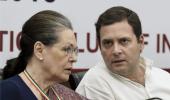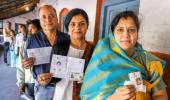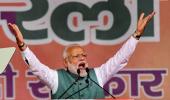India had a record voter turnout of 66.4 per cent in 2014. This is still lower than the global median of 68.03 per cent, reports Sachin Mampatta.

India's 900 million voters will take part in the world's biggest democratic exercise when the country goes to elections next month.
However, an analysis of the data from across the world suggests that India is behind several countries when it comes to the number of people turning out to vote.
The analysis is based on data from 184 elections across the world which pegs the median voter turnout at 68.03 per cent.
The median denotes the middle value in a data-set.
This means that there are an equal number of elections which had higher voter turnout than this median figure, and an equal number with lower turnout.
The data is from the Stockholm-based International Institute for Democracy and Electoral Assistance (International IDEA).
Business Standard's analysis looked at voter turnout in the most recent polls.
Elections in 2014 or later were considered to make the numbers more comparable with India.
India had a record voter turnout of 66.4 per cent in 2014. This is still lower than the global median of 68.03 per cent.
India also lags many of its neighbours, including Bhutan and Sri Lanka.
One way to increase the participation rate could be greater gender parity.
The voting rate among women has been lower than men in every poll since the Independence.
Also, more female participation would result in a higher overall turnout figure.

The implications of higher female participation may also be felt politically, suggested a June 2013 paper by Mudit Kapoor and Shamika Ravi in an Indian School of Business study.
Women may be more likely to vote for change.
"Our results strongly suggest that an increase in the female voters turnout negatively... (affected) the probability of re-election for a political party in a given constituency. And in contrast, the results also show that male voters increased the probability of re-election of political parties," said the authors.












 © 2025
© 2025